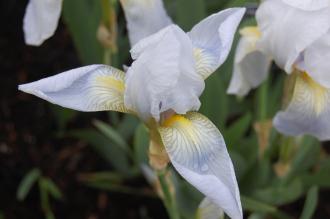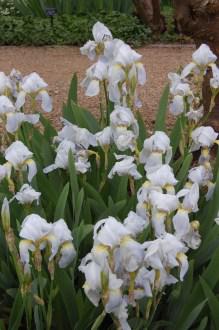
Iris germanica ‘Florentina Flower (05/05/2012, Kew Gardens, London)
Position: Full sun to light shade
Flowering period: Late spring to early summer
Soil: Moist, well drained
Eventual Height: 90m
Eventual Spread: 30cm (each leaf cluster)
Hardiness: 3a – 9a
Family: Iridaceae
Iris germanica ‘Florentina’ is a semi- evergreen, clump forming, erect, herbaceous perennial. Its gray/ green leaves are lanceolate with entire margins and gradually narrowing to a point, erect, emerging from its rhizome and up to 35cm long and 4cm broad at their base. Its pale lilac hermaphrodite flowers are fragrant and emerge from a branched stem which emerges from the base of the leaf cluster and is up to 90cm tall. Its fruit is a loculicidal capsule. Its roots are rhizomes which allow this plant to steadily spread.
The species Iris germanica, commonly known as Wild Bearded Iris or the Bearded German Iris, is a natural European hybrid. Iris germanica ‘Florentina’ is commonly known as the Florentine Iris. According to Linnaeus in 1762, Iris Florentina’ was one of the most important irises to be grown commercially across Europe, used to make Orris root, a powder to add fragrance to perfume or flavor to Chianti wine.

Iris germanica ‘Florentina’ (05/05/2012, Kew Gardens, London)
The etymological root of the binomial name Iris is derived from the Greek word for a rainbow, referring to the wide variety of flower colours found among the many species. Germanica is from the Latin meaning ‘from Germany’. Florentina is a Latinised word meaning ‘from Florence’.
The landscape architect may find Iris germanica ‘Florentina’ useful as an effective spreading ground cover plant with showy flowers.
Ecologically, I. germanica ‘Florentina’ is attractive to bees and pollinating insects.
The Royal Horticultural Society has given I. germanica ‘Florentina’ their prestigious Award of Garden Merit in 1994.
I. germanica ‘Florentina’ prefers moist, fertile, well-drained soils. It tolerates most pH of soil, and will tolerate very alkali soils.
Iris germanica ‘Florentina’ requires little maintenance. Large clumps may be divided, this should be carried out six weeks after flowering

